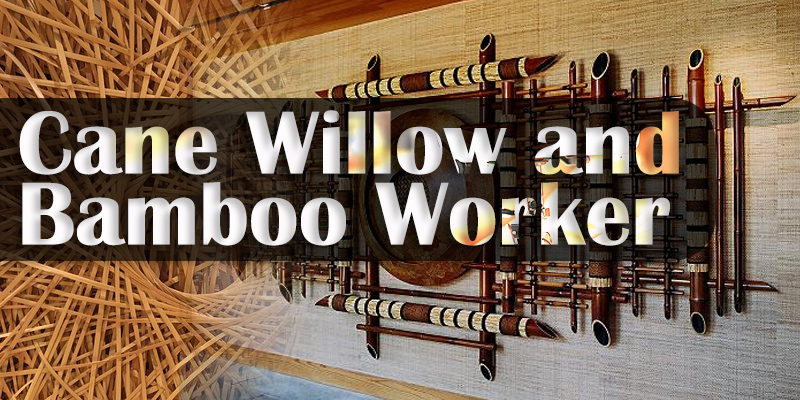
The syllabus for the ITI Trade "Cane Willow and Bamboo Work" in English. This one-year course, offered under the Craftsman Training Scheme (CTS) by the National Council for Vocational Training (NCVT), trains students in crafting products from cane, willow, and bamboo, such as furniture, baskets, and decorative items. The syllabus includes Trade Theory, Trade Practical, Workshop Calculation and Science, Engineering Drawing, and Employability Skills. Here’s the detailed breakdown:
1. Trade Theory
This section provides theoretical knowledge about cane, willow, and bamboo processing and crafting.
- Introduction to Cane, Willow, and Bamboo Work
- Importance of cane, willow, and bamboo as sustainable materials.
- Scope and opportunities in handicraft industries.
- Raw Materials
- Types and properties of cane, willow, and bamboo.
- Identification of suitable species for different products.
- Defects and quality assessment of raw materials.
- Preservation and Treatment
- Methods: drying, chemical treatment, and smoking.
- Seasoning techniques to prevent decay and enhance durability.
- Tools and Equipment
- Hand tools: knives, splitters, scrapers—uses and maintenance.
- Power tools: drills, sanders—operation and safety.
- Measuring tools: rulers, calipers.
- Crafting Techniques
- Weaving patterns for mats and baskets.
- Joining methods for furniture (e.g., binding, nailing).
- Finishing processes: dyeing, varnishing, and polishing.
- Product Types
- Furniture: chairs, tables, shelves.
- Utility items: baskets, trays, mats.
- Decorative items: lamp shades, gift articles.
- Safety Practices
- Personal safety: use of gloves, goggles, and aprons.
- Workshop safety: handling sharp tools and preventing accidents.
- Entrepreneurship
- Basics of starting a small handicraft business.
- Market trends and cost estimation for products.
2. Trade Practical
This hands-on component develops skills in processing and crafting with cane, willow, and bamboo.
- Material Preparation
- Select and cut cane, willow, and bamboo into strips or slivers.
- Treat and season raw materials using drying and chemical methods.
- Tool Handling
- Use hand tools to split, scrape, and shape materials.
- Operate power tools for drilling and sanding.
- Weaving and Crafting
- Weave mats and baskets using different patterns.
- Construct furniture frames (e.g., chair, table) with joints and bindings.
- Make decorative items (e.g., lamp shades, trays).
- Finishing Techniques
- Dye and stain materials for color enhancement.
- Apply varnish or polish for a smooth finish.
- Repair and Maintenance
- Repair damaged cane, willow, or bamboo products.
- Maintain tools and equipment for longevity.
- Project Work
- Design and create a complete product (e.g., basket, chair, or decorative piece).
- Assess quality and prepare for display or sale.
3. Workshop Calculation and Science
This covers mathematical and scientific principles relevant to the trade.
- Calculations
- Measurements: length, width, and thickness of materials.
- Simple cost calculations for raw materials and products.
- Science
- Properties of cane, willow, and bamboo (e.g., flexibility, strength).
- Effects of moisture and preservatives on materials.
4. Engineering Drawing
This focuses on technical drawing skills for designing products.
- Drawing Basics
- Sketch simple shapes and patterns manually.
- Use scales and basic drafting tools.
- Product Designs
- Draw layouts for furniture and baskets.
- Create plans for weaving patterns and assemblies.
5. Employability Skills
This enhances professional skills for job readiness.
- Communication
- Interact effectively with team members and customers.
- Workplace Skills
- Time management, teamwork, and basic problem-solving.
Course Overview
- Duration: 1 year (2 semesters of 6 months each)
- Eligibility: Passed 8th class examination from a recognized board.
- Objective: To train individuals in processing cane, willow, and bamboo, crafting products, and maintaining tools, preparing them for roles in handicraft industries, furniture making, or self-employment.
This syllabus aligns with the NCVT framework and may vary slightly by state or ITI. For the latest details, refer to the Directorate General of Training (DGT) website or local ITI resources. The course emphasizes practical skills and sustainability, making it ideal for careers in traditional crafts and small-scale enterprises. Let me know if you need specific sections (e.g., Trade Theory or Trade Practical) for your purposes!
Trade Type
- 7 views